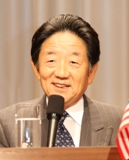��Membership and Extension Month�� Meeting
��Prospect and Issues of the Japanese
Economy under DPJ Government��
August 4, 2010
Mr. Haruo Shimada
President
Chiba University of Commerce
 1. Introduction
1. Introduction
��The Democratic Party of Japan (DPJ) won a landslide victory in the general election last summer. However, it lost many seats in the Upper House election held on July 11th this year, which resulted in losing its majority in the Upper House.
��The Japanese economy continues to suffer from financial constraints and declining competitiveness. The most alarming fact is the absence of essential coherent government policies to deal with the problems that command public support.
2. Expectations for DPJ government and the reality
��Expectations of the DJP were unrealistically high and when problems occurred their popularity waned. Firstly, its coalition partners, the People��s New Party and the Social Democratic Party, meddled with economic policies and security issues. Secondly, dubious political funding arrangements tainted Mr. Hatoyama and Mr. Ozawa. Thirdly, Mr. Hatoyama made false promises over the Futenma Base issue and shattered the trust of Okinawa people and, most damagingly, he betrayed US confidences. Fourthly, his regime wasted a year in trying to tackle the deep-seated economic problems.
��I sympathized with the pre-election Manifesto��s objective of helping those in greatest need. However, the government has not begun to deliver. Failure to sort out the temporary workers�� system discourages companies from hiring new workers. Confusion persists about the purpose of child allowances. The government has not grasped that the demand for child-care facilities far exceeds the demand for universal cash hand-outs or that free tuition for public senior high-school should be means-tested.
3. Economic policies that undermine the Japanese economy
The Post Office fund has savings of 200 trillion yen and they have been mismanaged with the fund propping-up inefficient and unprofitable organizations.
��The government downplays the country��s current debts of 970 trillion yen, spuriously citing the fact that the people��s assets are 1,400 trillion yen, ignoring the fact that during the next financial year debts are expected to exceed assets.
��When the international financial markets focus on this problem the government bond prices will collapse and interest rates will rise sharply, forcing a rise in taxes. The interaction of these forces could undermine productivity and the country��s competitiveness, unleash inflationary forces and thereby reduce financial asset values, replicating the problems seen in Argentina and Russia.
4. Political deadlock and people��s option
��The Liberal Democratic Party of Japan (LDP) had many internal problems but the principal criticism of the LDP was its failure to recognize enormous global changes in the late 1980s and prepare Japan to deal with them. Firstly, the collapse of the Berlin Wall in 1989 heralded dramatic changes in international security but Japan still clung to its Cold-War security framework. Secondly, Japan totally failed to reform its pension and social security systems to take account of the dramatic consequences of the twin problems of a declining birthrate and aging population. Having been at the forefront of an IT revolution, Japan has since failed to meet the global competition unleashed in the last 20 years by the deregulation in foreign financial and communication sectors. The country finally lost patience with the LDP, yet the DPJ government does not inspire confidence that it can set a new course and restore Japan��s economic growth rates.
5. People��s option and economic strategy to revitalize Japan
��The DPJ government has key issues that it must address.
��The first responsibility of any country��s government is the security of its people. Japan must redraw its security arrangements to take account of a different world and recognize the great importance of information in military strategy.
��Economic growth is a pre-requisite to address the very pressing economic and social problems. Japan is not self-sufficient in food or energy and its economic growth will remain dependent on exports but more efficient farming, improved medical care and the housing industry can contribute to higher GDP.
��In the next 20 years Japan must rise to the inevitable economic challenge from China. By 2030 China��s GDP is forecast in nominal and real terms to be 5 and 10 times respectively higher than Japan��s GDP. We owe it to the young and the next generation to address these major challenges now because they will not disappear.